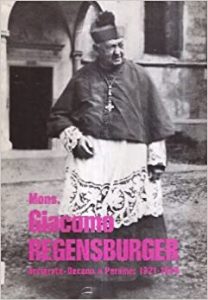Monsignor and federal president from 1922 until 1926, voice of the confessional movement that prevailed in the debate within the Federation of Cooperative Consortia (the future Federation of Cooperation in Trentino). His religious life intertwined always indissolubly with that of the cooperative member.
Giacomo Regensbutger was born in Predazzo in 1864 in a family of humble origins. Supported by a local notary, noted for his intelligence and perseverance, he was able to study in Trento and he was ordained as a priest in 1889. He moved first to Vigo di Fassa, then to Marco di Rovereto; since then he was active together with the pioneers of cooperation in Trentino Celestino Endrici, don Lorenzo Guetti, don Giovanni Battista Panizza and Emanuele Lanzerotti, with whom he had a leading role in the creation of the cooperative movement and its institutions.
During his first experience as a parish priest in Marco di Rovereto he contributed to establish the “cassa rurale” (credit institution) and he was its director, he also participated in the foundation of the federation of cooperative consortia of the Italian part of the province. He promoted the “Cassa Rurale” in Lizzana and the cooperative society in Sacco.
After the congress in Mori in 1899 he joined the council of Federation of Cooperative Consortia and he was councilor and president from 1922, following Emanuele Dalponte’s sudden death.
Those were the years of dissemination, also in Trentino, Socialist theories, to which don Regensburger strenuously opposed as a leading actor of the confessional cooperative movement, in opposition to the neutral tendency. He fostered the creation of the Catholic Bank in Trentino, at the expense of the Bank of Saint Vigilius.
So he said, as mentioned by Corradini, concerning the threat of socialist ideas: we aimed at occupying the place, taking the reins, directing the masses to save the religious Catholic belief in people. And we did it on time so that socialists found everything already organised and led by Catholics. Their attempts to seep in our ranks didn’t succeed: they realised to have arrived late to Trentino (...)
In relation to the confessional approach:
there was no lack of criticism, and not only by enemies, but also by many good people who saw almost an offense to christian charity in confessionalism; but the experience proved us right: in fact in two or three societies, in which this spirit had set, such discord arose that they were forced to close. The struggle, supported in defense of a new relocation lasted for about 4 years; afterwards the contenders were almost bewildered, when they saw the central institutions appear, the Catholic Bank, The Industrial Bank, the Federation of economic Consortia,the Health Insurance and the agricultural industrial Trade Union, organisations that referred to the DIOCESAN COMMITTEE, flowing like blood to the heart. Little criticism ended, all our weapons were put down and leading men disappeared, as our things, they ended up deserving the esteem and admiration of everybody, even the honest rivals.
He relocated to Storo and after to Condino, where he continued his work of promotion and creation of local cooperative organisations and he contributed to the reconstruction and enhancement of the cooperative organisation after WWI.
In 1921 he became canon ad honorem of the Dome of Trento and dean in Pergine and from 1922 president of the Federation. His role was always characterised by a moral approach addressed to cooperative members. The social issue was primarily a moral issue for him and cooperativism wasn’t a matter of shop but a “reciprocal work for a mutual good”.
When he took office as a president he spoke to cooperative members through the Bulletin of Federation with these words:
cooperation is a weapon and a weapon needs a soldier and sacrifice is required by the soldier.
Let’s honor the cause of cooperation and rename it the Holy Case: let’s get into the Church spirit that invites us to reform the spirit in our bodies, let’s think that our sacrifice, in addition to being a recompense itself, will also have a reward by God.
Despite his antiliberal and antisocialist opinions, he was removed from office with the rise of fascism and the Federation was placed under receivership.
These were difficult years for the society in Trentino: fascism entered every sector including the cooperative one, initially with threats to the individual cooperatives on the territory and then with a real repression of the representative bodies.

Further readings:
• Corradini Fortunato, Mons. Giacomo Regensburger, Trento, Scuola Tipografica Arcivescovile Artigianelli, 1951
• Mons. Giacomo Regensburger. Nel XXV° della morte. Predazzo 1864–Canale di Pergine 1948, Trento: s.d., 1973
• Comitato per le onoranze, Mons. Giacomo Regensburger. Arciprete- Decano a Pergine: 1921-1946, 1973, pp.28
• Renzo Tommasi, La vita e le opere dell’apostolo e del cooperatore mons. Giacomo Regensburger, Federazione Trentina della Cooperazione - Fondazione Museo storico del Trentino, Trento, 2013



